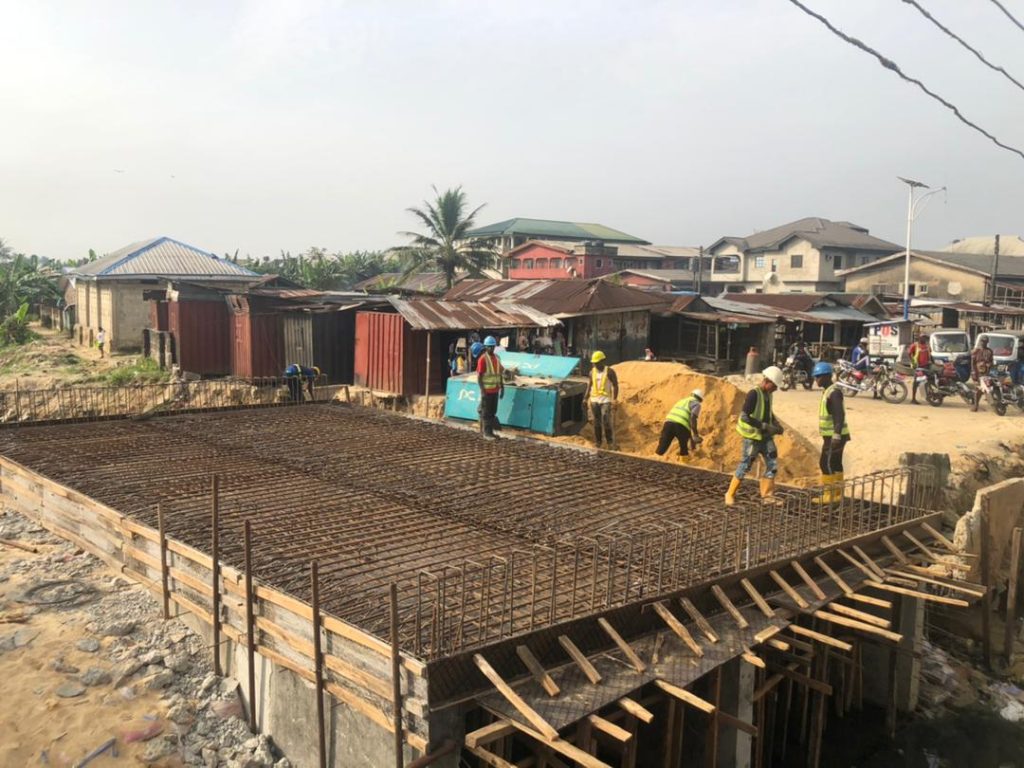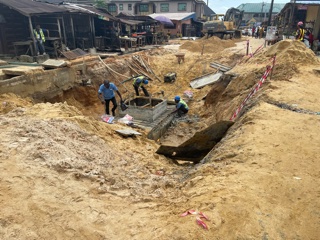
Rising Tides, Sinking Cities: How Climate Change is Driving More Extreme Flooding
By Engr. John Cee Onwualu (FNSE)
Climate change continues to threaten our planet, with the most immediate threat being extreme flooding.
Rising tides and sinking cities have become a stark reality with devastating consequences for many communities around the world. It’s a global problem that requires immediate attention and action from governments, businesses, and individuals.
In recent years, increased levels of carbon dioxide emissions have led to warmer ocean temperatures and melting polar ice caps, causing sea levels to rise. The impact of these changes has been acutely felt in many coastal areas in Nigeria, as an example, causing more intense and frequent flooding.
This blog post will explore the relationship between climate change and extreme flooding, and how it is affecting cities and towns across the world. We will examine the science behind rising sea levels and how it affects our coasts, as well as the social and economic impact of flooding.
We will also take a closer look at the strategies and technologies being used to mitigate the effects of climate change on flooding.

1. Climate change is causing sea levels to rise, leading to an increased risk of flooding in coastal cities.
As the Earth’s temperature continues to warm, it accelerates melting glaciers and ice sheets, leading to an increase in sea levels. This rise in sea levels is causing flooding in many coastal cities worldwide.
Flooding is now becoming a significant problem, and the situation is expected to worsen in the coming years if remedial measures are not taken. This problem is not just limited to coastal cities but is also affecting inland areas.
For instance, in Nigeria, the tributaries to the River Niger are experiencing frequent and more severe flooding, causing significant damage to properties and basic infrastructure.
The flooding issue in these coastal cities and other areas is complex, but drainage problems happen to be a significant reason for the increased flooding. That is why it is essential to develop effective drainage solutions to alleviate the immediate and long-term impact of this problem.

2. Warmer temperatures are causing more extreme weather events, including heavy rainfall and storms that exacerbate flooding.
Warmer temperatures associated with climate change are resulting in an increase in extreme weather events, including intense rainfall and storms that exacerbate flooding. This issue is particularly concerning for areas like the tributaries to the River Niger, where frequent flooding is already a significant problem.
As already stated, to address the impact of climate change on flooding, it is essential to identify and prioritize effective drainage solutions.
Addressing drainage problems on smaller scales, such as urban areas and rural farms, can help mitigate the effects of extreme weather events in the long term.
Through collaboration and innovative problem-solving, local governments, community groups, and private industry can work together to develop sustainable drainage solutions that can effectively manage floodwater during extreme weather events.
Ultimately, it will take a comprehensive approach to address the growing challenge of flooding caused by global climate change.

3. Cities need to invest in infrastructure to protect against flooding, including sea walls and drainage systems.
In order to safeguard coastal urban regions, public administrators must invest in comprehensive infrastructure solutions that can protect against the devastating effects of flooding.
As sea levels continue to rise due to climate change and more intense rainfall, the risk of flooding grows larger every year. In order to mitigate the impact of flooding, cities need to invest in drainage solutions that can remove excess water from streets and buildings, reducing the likelihood of standing water causing damage.
Furthermore, cities need to install seawalls and levees in order to prevent water from rising and potentially inundating low-lying areas.
However, it is important to note that drainage problems exist in many urban areas across the globe, with outdated infrastructure contributing to the issue. Therefore, more investment and attention are necessary in order to protect millions of people from the consequences of rising seas and severe weather patterns.

4. Individuals can also take steps to prepare for flooding, such as creating an emergency plan and purchasing flood insurance.
In addition to implementing drainage solutions to address drainage problems, individuals can take steps to prepare for the increasing risk of flooding caused by climate change.
Creating an emergency plan and purchasing flood insurance are key actions that can help mitigate the potential financial impact of flooding.
An emergency plan should outline what to do in the event of a flood, including where to evacuate, important phone numbers and medical information, and a plan for pets or livestock.

5. The economic costs of flooding are staggering, including damage to property and infrastructure, disrupted business operations, and lost productivity.
Flooding is an issue that has plagued humanity for centuries, and due to climate change, its severity has only worsened. The economic costs of flooding are staggering, affecting homes, businesses, and critical infrastructure.
In many parts of the world, cyclical flooding has created a persistent challenge for communities. Further, drainage problems exacerbate flooding, and the need for drainage solutions is more critical than ever.
The cost of unmitigated flooding can be difficult to quantify as it can affect both the present and future productivity of entire regions. It is essential for governments and businesses to take proactive steps to address flooding issues and prepare for the challenges that lie ahead.

6. Low-income communities and marginalized groups are often hit the hardest by flooding, exacerbating existing inequalities.
Flooding is a natural disaster that has become increasingly frequent and severe due to climate change. It affects not only individuals but also entire communities and cities, causing significant damage to infrastructure and creating health hazards.
Low-income communities and marginalized groups are often hit the hardest by flooding, exacerbating existing inequalities.
In particular, Tributaries to the River Niger, such as the Benue and Kaduna rivers, have been known to flood regularly, wiping out farms, homes, and businesses.
Additionally, drainage problems often occur, leading to more frequent flooding. Improper drainage solutions can cause water to accumulate instead of being carried away, leading to standing water which can become a breeding ground for disease-carrying insects, such as mosquitoes.
Addressing these challenges requires a multi-faceted approach that incorporates sustainable city planning, disaster preparedness, and community resilience.

7. Climate change is a global problem that requires international cooperation to solve.
One of the most pressing issues facing our planet is climate change, which has led to the increased frequency and severity of natural disasters, including floods. This is particularly evident in a country like Nigeria, where flooding has become a recurring problem.
Unfortunately, addressing this requires more than just local action; climate change is a global problem that requires international cooperation to solve. In addition to implementing various drainage solutions, it is essential that we engage in collaborative efforts with other nations to reduce greenhouse gas emissions and mitigate the effects of climate change.
Failure to act quickly and effectively could result in more extreme flooding events, causing significant damage and loss of life. It is time for us to take action to address these pressing global challenges.
Read Also: Navigating the Risks of Floods: Civil Engineering Strategies for Managing Flood-Prone Areas
8. While reducing carbon emissions is essential for addressing climate change in the long term, immediate action is also needed to adapt to the impacts of rising seas and extreme weather.
In the context of climate change, the increasing frequency and intensity of flooding events in coastal cities is an impetus for immediate action.
Although reducing carbon emissions is one of the primary solutions to addressing climate change in the long term, it is essential to prioritize measures to adapt to immediate impacts such as rising seas and extreme weather.
Given the urgency of the situation, climate change adaptation planning needs to emphasize timely intervention while also promoting strategies that address the root causes of extreme weather events such as deforestation and other anthropogenic activities that exacerbate climate change.
Read Also: 7 Ways To Handle Flooding in Any Part of Nigeria
9. Many cities are already taking steps to adapt and become more resilient to flooding.
As discussed, flooding is a serious issue that affects many cities around the world, and the problem is only getting worse due to climate change. However, many cities are already taking steps to become more resilient to flooding and mitigate its impact.
For instance, in the region surrounding the Niger River in West Africa, many cities have implemented drainage solutions to manage the tributaries that feed into the river during heavy rainfall.
These solutions include building retention ponds, improving urban green spaces, and revamping the drainage system. Likewise, in many other urban areas, communities are working to create green infrastructure, such as permeable pavement and green roofs, to effectively manage stormwater runoff.
While these efforts are not guaranteed solutions to flooding problems, they do offer a path forward towards a more resilient and sustainable urban future. Ultimately, it is important for cities to continue to explore new solutions and evaluate the effectiveness of existing approaches to address the pressing issue of flooding and related drainage problems.
Read Also: Assessing Quality Civil Engineering Practices in Nigeria
In conclusion, rising sea levels and more frequent and extreme weather events driven by climate change are putting many coastal cities around the world at risk of flooding. This issue should be an urgent concern for policymakers, city planners, and residents alike.
Unless serious action is taken to mitigate the effects of climate change, the problem of flooding is likely to get worse in the coming years, resulting in devastating consequences for communities and economies alike.
It is critical that we all work together to find effective solutions to prevent rising tides and sinking cities.
Want to hire a stormwater construction company? Read this first:
7 Things You Need to Know Before Hiring A STORMWATER CONSTRUCTION COMPANY